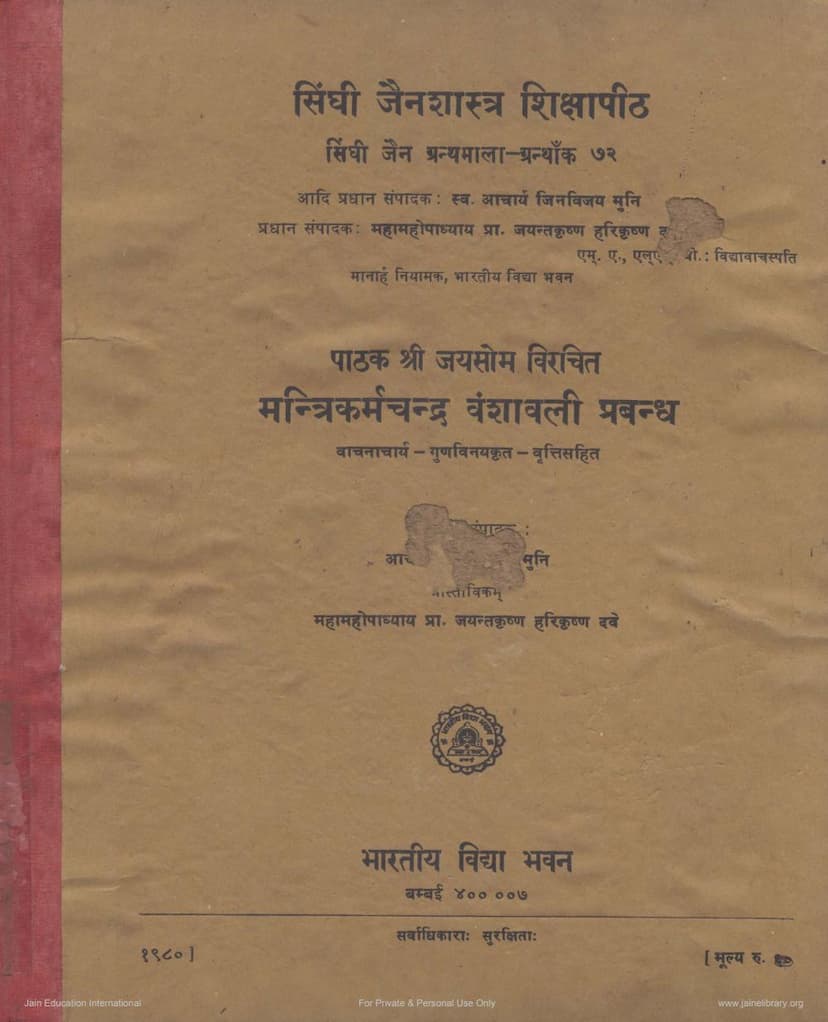Mantri Karmchandra Vanshavali Prabandh
Added to library: September 2, 2025

Summary
The Mantri Karmchandra Vanshavali Prabandha (The Chronicle of Minister Karmachandra) is a significant Jain historical text authored by Jayasoma Pathaka, a disciple of Pramoda Manikya. The work, with a Sanskrit commentary by his disciple Gunavinaya Vaca, chronicles the life and lineage of Minister Karmachandra, a prominent Jain statesman and philanthropist from Bikaner in the service of the Mughal Emperor Akbar. The Bharatiya Vidya Bhavan published this critical edition in 1980 as part of the Singhi Jain Series.
Here's a comprehensive summary of the text based on the provided pages:
Key Figures and Context:
- Minister Karmachandra: The central figure of the chronicle, he was a descendant of Vatsaraja, belonging to the Osval Vaisya community. He served as a minister in Bikaner, Rajasthan, during Emperor Akbar's reign. He is described as an orthodox Jain, an astute statesman, and known for his extensive charity.
- Jay Soma Pathaka: The author of the original work, writing in Sanskrit.
- Guna Vinaya Vaca: The commentator who wrote a Sanskrit commentary and also a Gujarati version of the text.
- Acharya Jina Vijaya Muni: The critically edited this volume and provided a general introduction.
- Mahamahopadhyaya Prof. Jayantha Krishna Harikrishna Dave: The General Editor of the Singhi Jain Series and author of the general introduction.
- Bharatiya Vidya Bhavan: The publisher, which has a long-standing relationship with the Singhi Jain Series, initiated with the support of Shri Bahadursimhaji Singhi.
Karmachandra's Life and Accomplishments:
The chronicle details Karmachandra's noble lineage and his rise to prominence through his statesmanship and devotion to Jainism. Key highlights of his life include:
- Appointment as Minister: Raised to the status of a Minister by King Raya Kalyana of Bikaner.
- Pilgrimages: Undertook pilgrimages to significant Jain holy sites like Satrunjaya and Girnar.
- Restoration of Jodhpur's Rulership: Fulfilled his ancestors' desire by restoring the rulership of Jodhpur to King Raya Kalyana.
- Acts of Benevolence:
- Abolished taxes and tolls on Vaishyas and stopped the work of potters and oil-sellers during the rainy season, demonstrating concern for the common people.
- Protected Jain temples at Abu from Mughal attacks through an ordinance from Emperor Akbar.
- Secured the release of prisoners from Sivpuri and Sirohi and provided them with food and clothing.
- Placed a golden Kalasa on the Abu temple.
- Opened relief camps during a severe famine, aiding the sick and needy.
- Recovered thousands of Jain idols that were removed by Tursamkhan, who mistakenly believed they contained gold, by offering an equivalent amount of gold.
- Received special favor from Emperor Akbar, allowing ladies of his family to wear golden ornaments on their legs.
- Repaired and reconstructed numerous temples at Satrunjaya, Mathura, and other places.
- Donated significantly for the construction of new temples at Satrunjaya and Girnar.
- Enforced Jain principles by stopping tree cutting in Marwar and fish killing in three rivers.
- Instituted Snatra Pujas and constructed stupas for Jinadatta Suri and Jina Kusala Suri.
- Relationship with Akbar: Karmachandra was highly respected by Emperor Akbar. He met Akbar in Lahore, where he was honored and offered a dignified position. He also played a role in introducing his guru, Acharya Jinachandra Suri, to Akbar.
- "Amari" Proclamation: Karmachandra was instrumental in facilitating Akbar's proclamation of "Amari" (non-violence/abstinence from killing) throughout the empire for seven days, which was subsequently observed in various regions for different periods. This highlights his influence in promoting Jain principles at the highest levels.
- Intellectual Pursuits: Heard the recitation of the eleven Angas of Jain scriptures from Jayasoma Upadhyaya.
- Shift in Patronage: When his ruler became unfavorable, he shifted to Medta, and Akbar summoned him to Lahore.
The Text's Structure and Content:
The book begins with introductions by the general editor and founder editor, detailing the significance of the Singhi Jain Series and the life of Acharya Jina Vijaya Muni. The main text, the "Mantri Karmachandra Vamsavali Prabandha," then unfolds, likely beginning with a prayer and eulogy to Jain Tirthankaras and revered gurus before delving into the genealogy.
The provided pages reveal a detailed genealogical account, tracing Karmachandra's ancestors back through various rulers and prominent figures in Jain history. It mentions names like:
- King Sagar of Devalavataka.
- His sons: Bohitha, Gangadas, and Jaysingh.
- Bohitha's lineage, including his eight sons and a daughter named Padma.
- Details of ancestors like Sri Karna, Samadhara, Udharana, Haridasa, Veeradas, and their descendants, highlighting their deeds and positions.
- Specific mentions of figures like Tejpal, Vilha, Kadua, Mera, Mandana, Uda, Vilsala, Lunakarna, and their contributions.
- The text intricately weaves together historical events, royal lineages, and the spiritual and charitable activities of these figures, emphasizing their adherence to Jain principles.
Commentary and Editorial Aspects:
The inclusion of Gunavinaya Vaca's commentary is crucial for understanding the nuances of the original Sanskrit text. Acharya Jina Vijaya Muni's critical editing ensures the accuracy and scholarly value of this publication, making it accessible to a wider audience interested in Jain history and literature.
In essence, the Mantri Karmchandra Vanshavali Prabandha serves as a valuable historical document that not only celebrates the life of a pivotal Jain minister but also offers insights into the social, political, and religious landscape of medieval India, particularly the flourishing of Jainism and the influence of its adherents in prominent courts.